Why Burial Vaults for Ashes Are Essential for Ground Burial
Burial vaults for ashes are protective containers that house cremation urns during ground burial, preventing soil collapse and protecting remains from moisture and heavy cemetery equipment. Most cemeteries require these outer burial containers even though state laws typically don't mandate them.
Quick Answer for Burial Vaults for Ashes:
- Purpose: Protect urns from soil pressure, moisture, and cemetery maintenance equipment
- Materials: Concrete, high-impact polymer, or metal construction
- Sizes: Standard 15"L x 15"W x 18"H, with low-profile and companion options
- Cost: $45-$615 depending on material and protection level
- Requirements: Most cemeteries mandate use, even when state law doesn't require them
- Benefits: Prevents ground settling, maintains cemetery appearance, protects investment
Without a vault, urns made of wood, ceramic, or thin metal can collapse under soil weight and moisture. This creates sunken graves that become both maintenance headaches and sources of emotional distress for families.
The cremation rate continues climbing nationwide, making proper ash burial practices more important than ever. Cemetery directors know that burial vaults for ashes aren't just about following rules - they're about preserving the dignity of final resting places and preventing costly ground repairs.
We're American Mortuary Coolers, and through years of supplying mortuary equipment nationwide, we've seen how proper burial vaults for ashes protect both funeral home reputations and family peace of mind.
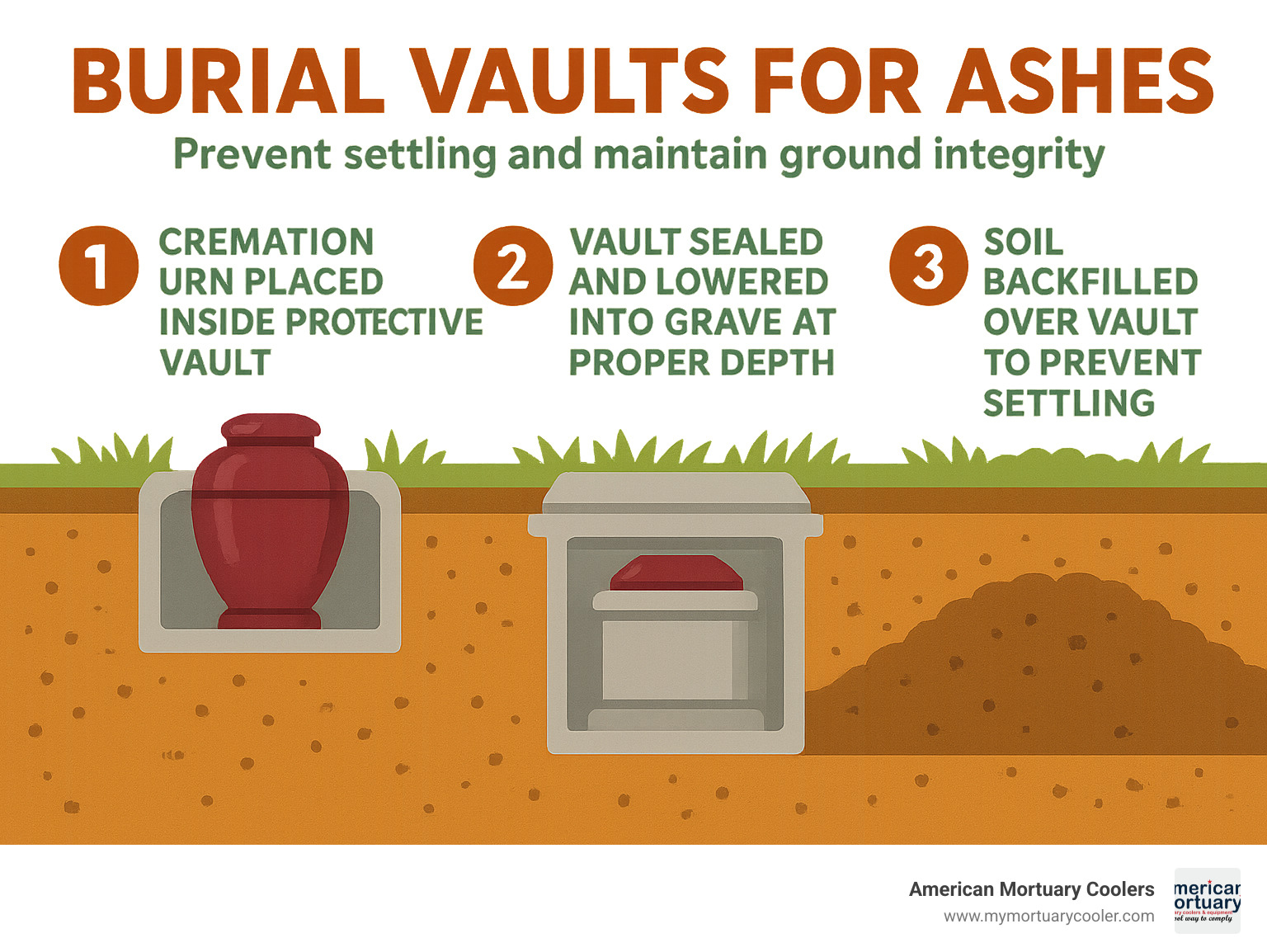
Learn more about burial vaults for ashes:
Understanding Legal & Cemetery Rules
While most states don't actually require burial vaults for ashes by law, nearly every cemetery will insist on them. Cemetery managers have learned what happens when urns go directly into the ground without protection - soil settles, containers break down, and sunken graves create safety hazards for maintenance crews.
Texas gives us a clear example with Texas Health and Safety Code Section 714.001.01. The law requires burial vaults for ashes to be buried at least 24 inches below the surface. So if your vault is 12 inches tall, the grave needs to be dug 36 inches deep total.
Several states have established specific burial depth guidelines: Texas requires 24 inches minimum cover, while Florida typically mandates 18-24 inches depending on location. California varies by county health department, New York follows local municipality requirements, and Pennsylvania generally requires 18 inches minimum.
Are urn vaults required by law?
State codes rarely mandate urn vaults directly. Instead, they focus on burial depth requirements and basic health safety measures. The real vault requirement almost always comes from individual cemetery policies designed to keep their grounds looking good and their maintenance operations running smoothly.
Cemetery managers know that without proper outer containers, urns made of wood, ceramic, or thin metal will eventually fail under soil pressure and moisture. This creates ongoing headaches with uneven ground and potential liability issues.
Typical cemetery requirements for burial vaults for ashes
Most cemeteries require an outer burial container at minimum. They'll specify minimum burial depth of 18-24 inches of soil cover above the container, charge weekend burial fees for Saturday or Sunday services, and require sexton notification with advance notice for grave opening and burial permits.
Burial permits need to be filed with the cemetery sexton, the county where the burial takes place, and the state vital records office.
How Burial Vaults for Ashes Protect What Matters
When planning a burial for cremated remains, understanding what burial vaults for ashes actually protect helps you make the right choice. These aren't just another funeral expense - they're your defense against real threats that can damage or destroy an urn over time.
Soil shifts, settles, and gets heavier when wet. Heavy cemetery equipment rolls overhead daily. Without protection, even sturdy urns face tremendous pressure that builds up over months and years.
Burial vaults for ashes work by spreading this pressure across their reinforced walls instead of letting it crush the urn. Modern vault materials can handle up to 2,950 PSI of pressure - serious structural strength that prevents the gradual crushing and cracking that destroys unprotected urns.
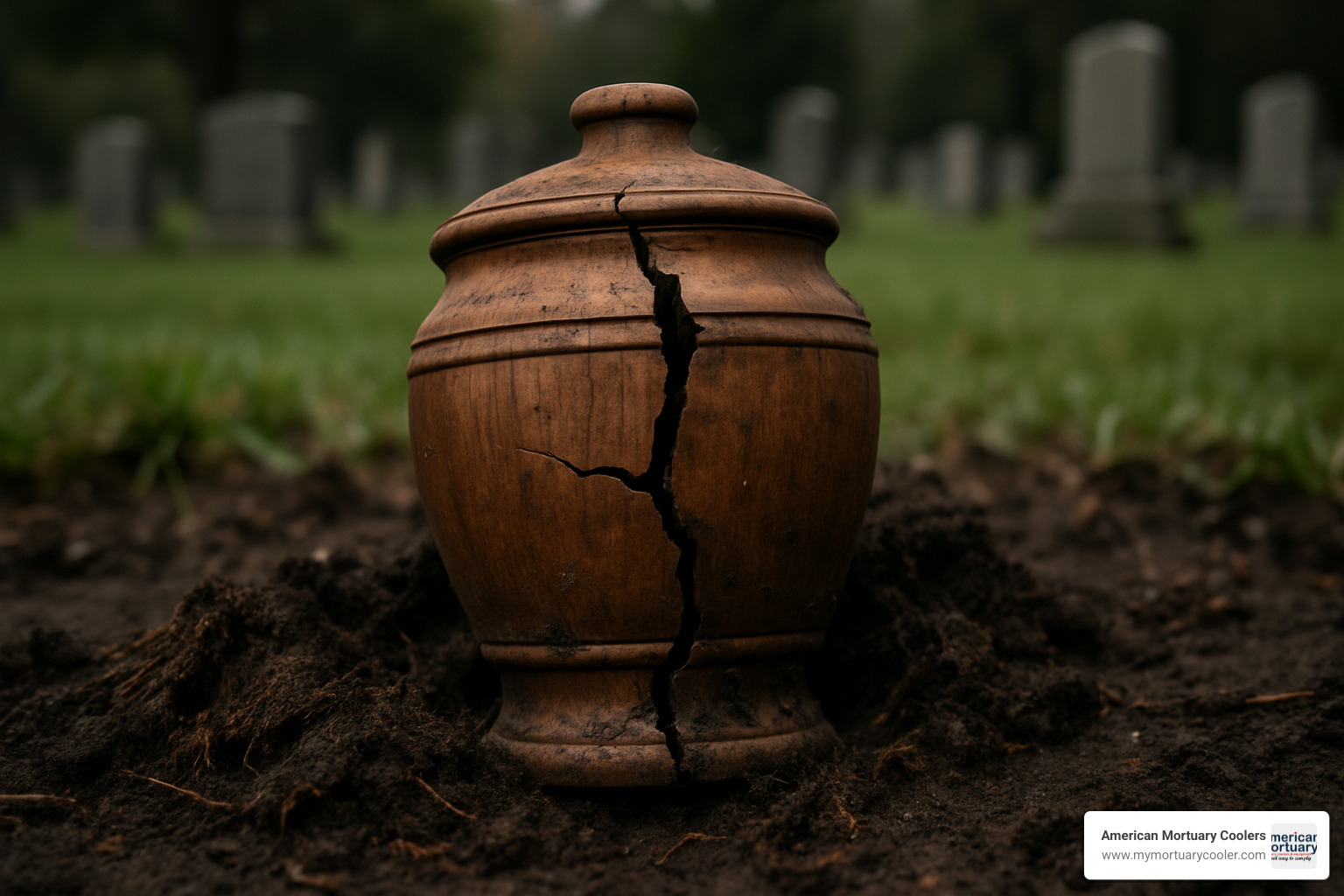
Cemetery appearance matters more than you might think. When graves sink because containers have failed underground, it creates ongoing maintenance headaches and visual reminders that something went wrong.
Key benefits at a glance
Ground support keeps everything level by distributing soil weight properly. Water barrier protection comes from sealed vault systems with gaskets or special adhesives. Equipment protection matters during daily cemetery maintenance when mowers and service vehicles pass over burial sites. Landscaping appearance stays beautiful when the ground remains level and stable.
Basic, Standard & Premium protection differences
Basic polymer vaults provide essential protection with high-impact plastic construction and simple sealing systems. These entry-level options cost between $45-$155 and meet most cemetery requirements.
Standard concrete vaults step up the durability with reinforced concrete shells and plastic or metal lining systems. In the $200-$400 range, these mid-level vaults often include mounting areas for nameplates.
Premium multi-layer vaults bring serious protection with vacuum-formed polymer liners, reinforced concrete shells, and advanced sealing systems. These $400-$615 options may include stainless steel, copper, or bronze components along with comprehensive warranties.
Materials, Sizes & Cost Breakdown
Choosing the right burial vaults for ashes starts with understanding what goes into making them. Each material brings its own strengths to the table.
Concrete vaults are the heavy hitters, providing maximum crushing strength and excellent moisture barriers when properly lined. They're heavy and require special equipment for handling.
Polymer vaults are the smart choice for many families. These high-impact plastic containers never rust, rot, or deteriorate, and they're light enough for safe handling. Most cemeteries readily accept polymer vaults as meeting their requirements at significantly lower costs.
Metal vaults bring premium protection with materials like steel, stainless steel, copper, or bronze. These resist corrosion beautifully and provide superior sealing capabilities.
Cultured marble vaults offer an attractive solution by combining durability with appearance. Many serve as combination urn-vault systems, eliminating the need for separate containers.
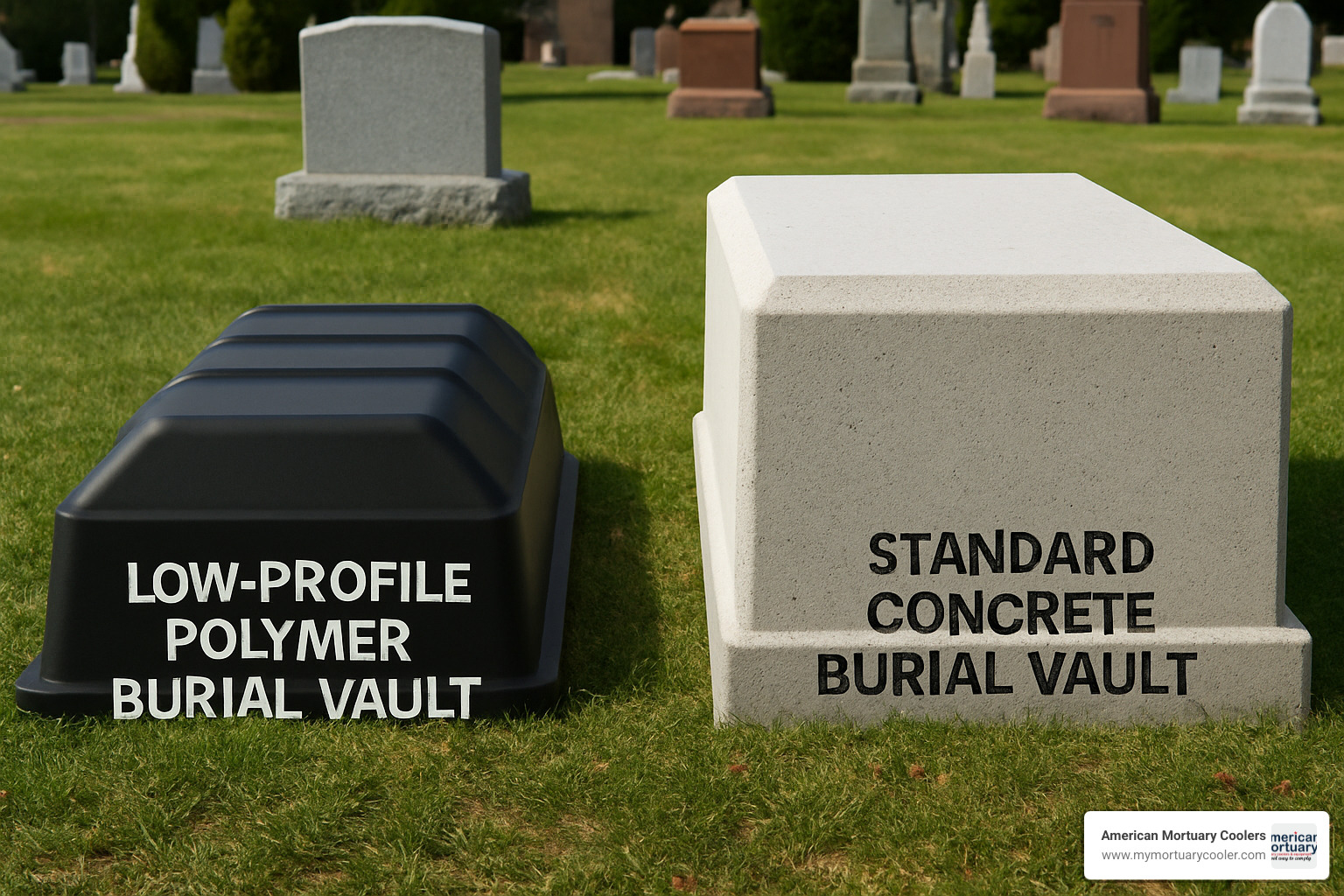
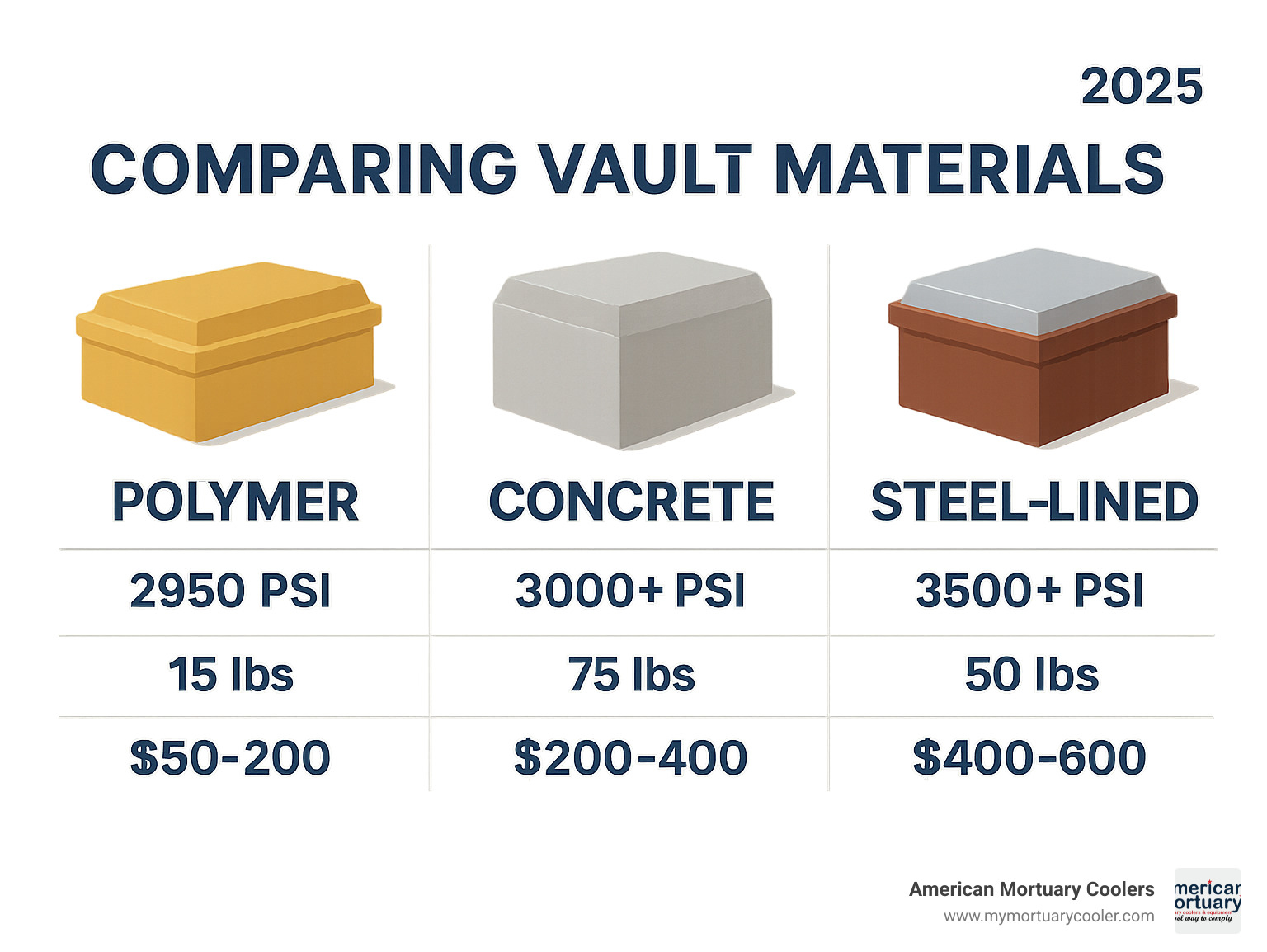
Typical sizes & capacities for burial vaults for ashes
Standard adult vaults measuring 15"L x 15"W x 18"H accommodate most cremation urns comfortably. Low-profile models at 15"L x 15"W x 14"H solve problems for cemeteries with shallow burial requirements. Companion vaults handle couples who want to rest together, typically measuring 16.5"W x 15"H x 12"D and accommodating two standard urns.
Child and infant vaults provide appropriately sized protection, typically ranging from 9"H x 12"W x 9"D. Oversized vaults handle special decorative urns or containers with significant keepsake storage.
What drives the price?
Material selection makes the biggest difference in your final bill. Basic polymer vaults start around $45, while premium metal-lined options can exceed $600. Lining systems add substantial cost but deliver superior protection. Customization options let families create meaningful memorials through engraved nameplates, photo appliqués, and military emblems, typically adding $50-$200 to base costs. Brand reputation and freight costs also influence final pricing.
Choosing & Personalizing the Right Vault
Finding the perfect burial vaults for ashes starts with understanding what your cemetery actually requires. Every cemetery has its own specification sheet that spells out the must-haves for materials, dimensions, and sealing systems.
Before you fall in love with any vault, check your urn's dimensions carefully. Those decorative handles or artistic flourishes need to fit inside the vault with room to spare. Some urns can actually do double duty - cultured marble containers, cast bronze urns, and solid stone pieces that pass compression testing can eliminate the need for separate vaults entirely.
The personalization options available today are impressive. Engraved nameplates transform basic vaults into personalized tributes. Photo appliqués let you include a favorite picture right on the vault surface. Custom emblems can reflect hobbies, professions, or personal interests.
Military families have particularly meaningful options available. Service emblems, branch insignia, and honors recognition can be incorporated directly into vault designs.
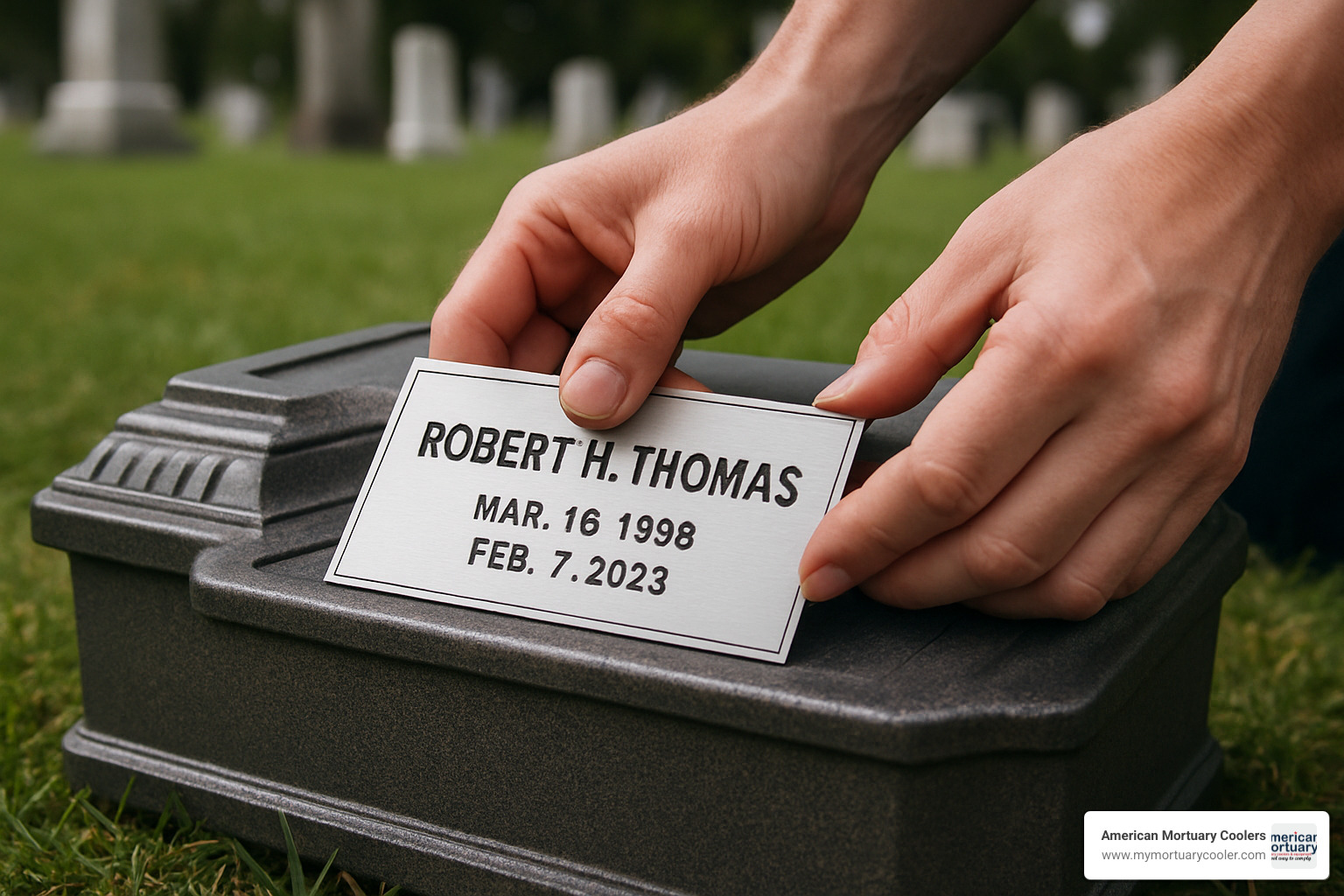
For detailed guidance on matching urns to vaults, check out our More info about urn-vault differences.
Alternatives to a separate vault
Cultured marble urn-vaults combine the container and protection in one solution. These units pass the same compression tests as separate vaults while offering over 40 color options and extensive engraving possibilities.
Bronze urns with sufficient wall thickness can serve as their own protection when they meet cemetery compression requirements. The upfront cost is higher, but you're buying two products in one.
For families drawn to wood urns, our guide to More info about wood urns provides detailed information about protection requirements and vault compatibility.
Matching vault type to cemetery rules & budget
Your vault needs to handle whatever your cemetery throws at it. Most facilities require 2,000-3,500 PSI strength depending on soil conditions and maintenance equipment weight.
Personalization levels should match both your heart and your wallet. Companion vaults accommodate sequential interments when spouses pass at different times.
Contact your cemetery management directly to verify vault specifications. Don't rely on general information or assumptions.
Step-by-Step Burial Process for Burial Vaults for Ashes
The burial process for burial vaults for ashes follows specific procedures that ensure proper depth, sealing, and final presentation.
Grave opening begins with precise measurements to ensure proper plot boundaries and depth calculations. Cemetery crews use the vault height plus 24 inches to determine total excavation depth, so a 12-inch vault requires a 36-inch grave.
Lowering equipment varies from simple manual placement for lightweight polymer vaults to mechanical lowering devices for heavy concrete units. Backfilling occurs in stages, with initial soil placement around the vault sides for stability, followed by complete coverage to the required depth.
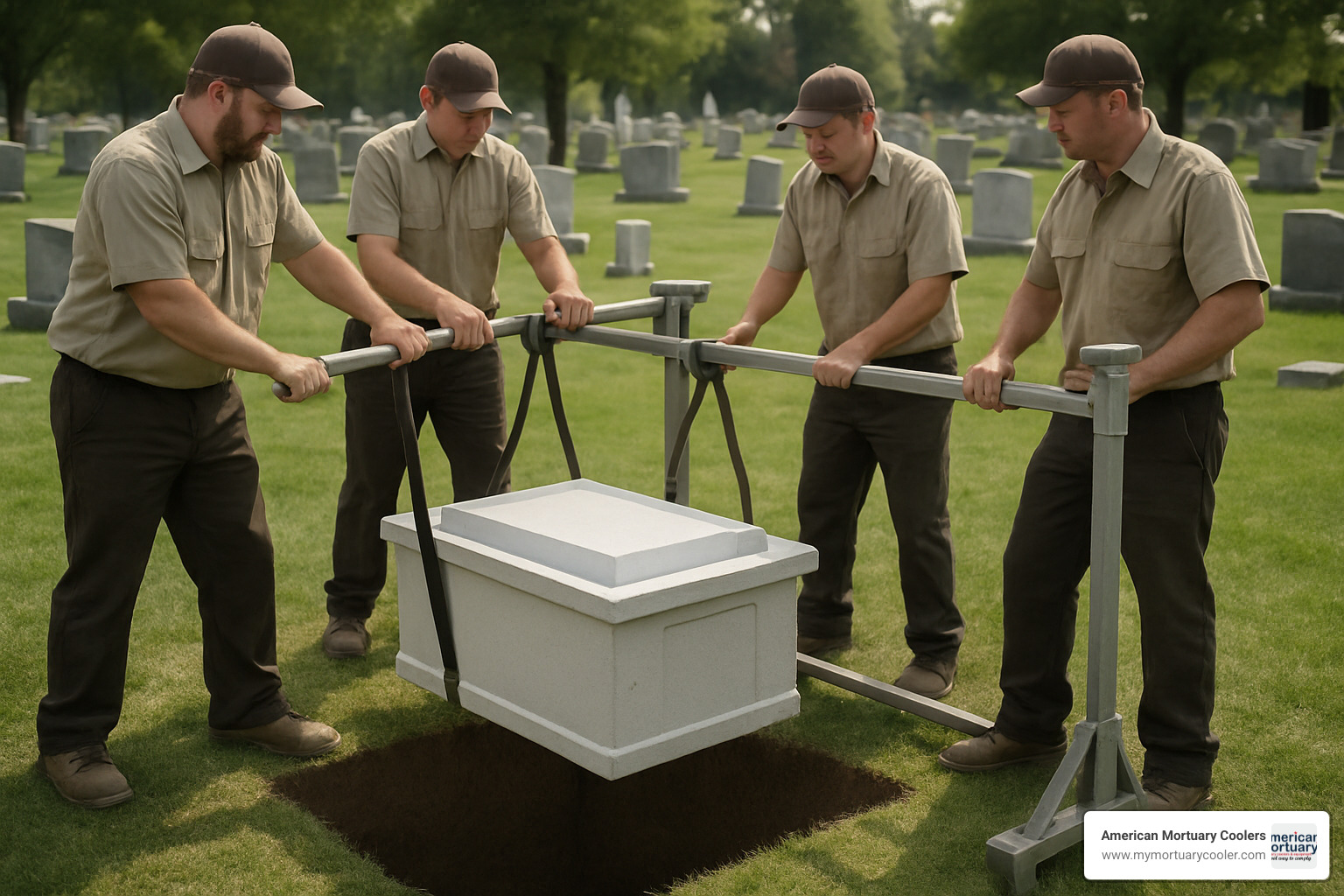
Garden burial on private property requires different considerations, including local zoning compliance, written property owner consent, and appropriate weatherproofing for outdoor memorial markers.
Special considerations for double/companion burials
Plot width requirements increase for companion vaults, and families should verify adequate space before purchasing double units. Second interment timing can occur immediately if both cremations are complete, or the vault can be sealed and reopened later for sequential placement.
Sealing protocols for companion burials often involve temporary sealing for the first interment, followed by permanent sealing after the second placement.
Home or garden burial checklist
Local zoning verification represents the critical first step, as many municipalities restrict or prohibit private property burials. Written consent from all property owners prevents future legal complications. Weatherproof markers designed for outdoor exposure ensure long-term memorial preservation.
Frequently Asked Questions about Burial Vaults for Ashes
Do vaults stop water completely?
The honest answer about burial vaults for ashes and water protection is "mostly, but not forever." Different sealing systems offer varying levels of moisture resistance.
Basic polymer vaults use tongue-and-groove connections that create effective barriers against normal groundwater and seasonal moisture. Premium vaults step up the protection with specialized gasket seals and adhesive systems that create superior water barriers.
Even the most advanced vault systems can't promise 100% water exclusion forever. Seals naturally degrade over many decades, and extreme weather events can overwhelm any protection system. The realistic goal is long-term moisture control that preserves the urn and its contents through normal burial conditions.
Can I place personal items in the vault?
Most families want to include meaningful keepsakes with their loved one's ashes, and cemeteries generally welcome this practice within reasonable limits. Small personal items like photographs, jewelry, letters, or cherished mementos typically receive approval for vault placement.
The key word here is "small." Vault space is limited, and items need to fit comfortably alongside the urn without preventing proper sealing. Non-organic materials like metal jewelry, ceramic items, or laminated photographs usually get approval from cemetery management.
Every cemetery maintains its own policies about personal items, so checking with your specific facility prevents disappointment during burial planning.
What happens if I skip a vault?
Skipping vault protection might seem like a money-saving shortcut, but the long-term consequences often cost far more than the initial vault investment. Without protection, urns face a losing battle against soil pressure and moisture exposure.
Wooden urns typically collapse within just a few years under soil weight and moisture infiltration. Ceramic containers last longer but eventually crack and crumble. When urns collapse underground, they create the dreaded sunken grave effect that's both unsightly and emotionally painful for visiting families.
Cemetery management faces ongoing maintenance problems with collapsed burial sites. They may bill families for grave releveling, soil replacement, and reseeding costs. In severe cases, cemeteries may require complete exhumation and proper vault installation to solve persistent ground stability problems.
The small upfront investment in burial vaults for ashes prevents these expensive and heartbreaking problems down the road.
Conclusion & Next Steps
Choosing the right burial vaults for ashes doesn't have to feel overwhelming. These protective containers serve one simple but crucial purpose: keeping your loved one's cremated remains safe and secure for generations to come.
Throughout our years at American Mortuary Coolers, we've seen families find peace of mind knowing they made the right choice. Whether you select a basic polymer vault for essential protection or invest in a premium multi-layer system with custom engraving, the important thing is ensuring your cemetery requirements are met while honoring your loved one's memory.
The funeral industry keeps evolving with new materials and personalization options, but some things never change. Your loved one deserves protection from soil pressure, moisture, and heavy equipment. Burial vaults for ashes provide that protection while maintaining the beautiful, level grounds that make cemetery visits peaceful rather than heartbreaking.
We've delivered our durable funeral equipment across Tennessee, Georgia, Illinois, South Carolina, Texas, California, New York, and Pennsylvania. Every delivery reinforces what we already know - families who invest in quality vault protection avoid costly problems down the road and sleep better knowing they did right by their loved one.
Ready to make your final selection? Our comprehensive guide Rest Easy: Best Urns for Human Ashes for Burial walks you through matching the perfect urn to your chosen vault system.
Planning ahead with burial vaults for ashes means one less decision during an already difficult time. Work with experienced funeral professionals who understand both your emotional needs and practical requirements.

















